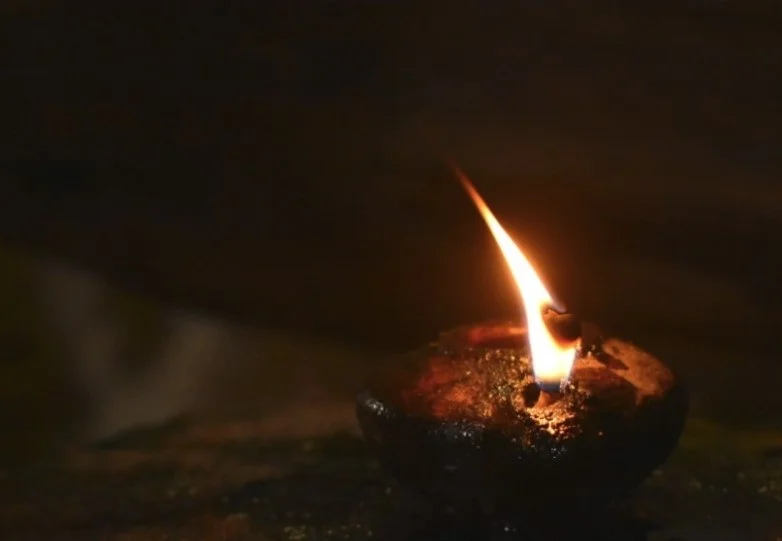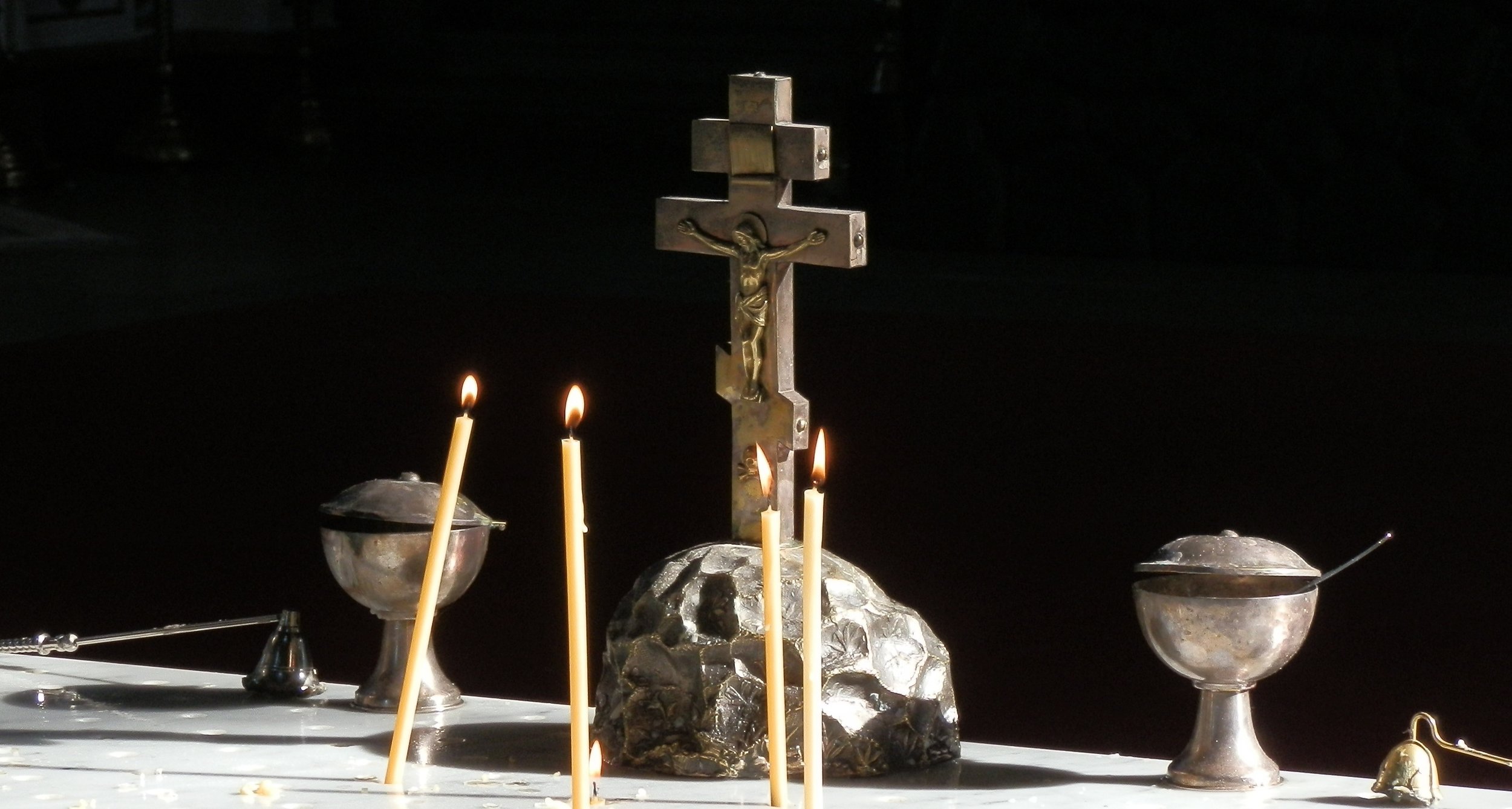Healing Atonement
Cyril of Jerusalem (315 - 386 AD)
An old clay oil lamp from Nazareth, Israel. Photo credit: Olivia Armstrong.
The Writings of Cyril of Jerusalem
Cyril of Jerusalem, Catechesis Lecture 2, paragraphs 1 - 4. Cyril asks and answers questions about sin:
“A fearful thing is sin, and the sorest disease of the soul is transgression…But some one will say, What can sin be? Is it a living thing? Is it an angel? Is it a demon? What is this which works within us? It is not an enemy, O man, that assails you from without, but an evil shoot growing up out of yourself. Look right on with your eyes and there is no lust… The devil then is the first author of sin, and the father of the wicked: and this is the Lord's saying, not mine, that the devil sins from the beginning : none sinned before him… having been created good, he has of his own free will become a devil… “Your heart was lifted up because of your beauty: for the multitude of your sins were you wounded, and I did cast you to the ground.” In agreement with this the Lord says again in the Gospels: I beheld Satan as lightning fall from heaven. Luke 10:18 You see the harmony of the Old Testament with the New. He when cast out drew many away with him. It is he that puts lusts into them that listen to him: from him come adultery, fornication, and every kind of evil. Through him our forefather Adam was cast out for disobedience, and exchanged a Paradise bringing forth wondrous fruits of its own accord for the ground which brings forth thorns.”
Cyril of Jerusalem, Catechesis Lecture 3. When Cyril talks about baptism, he reflects on Jesus’ own baptism in the Jordan River. He thinks of baptism as a repentance and a cleansing from past sinful actions (3.2 - 8). Then, Cyril says Jesus was exceptional because he had not sinned in action:
“He was baptized not that He might receive remission of sins, for He was sinless; but being sinless, He was baptized, that He might give to them that are baptized a divine and excellent grace” (3.11).
That Cyril means Jesus was sinless in terms of actions-choices as opposed to bearing an unfallen human nature becomes clear later. For he immediately says in the next paragraph:
“For you go down into the water, bearing your sins, but the invocation of grace, having sealed your soul, suffers you not afterwards to be swallowed up by the terrible dragon. Having gone down dead in sins, you come up quickened in righteousness. For if you have been united with the likeness of the Saviour's death [Romans 6:5], you shall also be deemed worthy of His Resurrection. For as Jesus took upon Him the sins of the world, and died, that by putting sin to death He might rise again in righteousness; so thou by going down into the water, and being in a manner buried in the waters, as He was in the rock, art raised again walking in newness of life” (3.12).
Cyril says that baptism is a co-baptism with Christ by participation, even as Jesus’ own baptism was a participation in his own death and resurrection. What does he mean when he says, “Jesus took upon Him[self] the sins of the world’? Since Cyril does not mean that Jesus took on the retributive justice of God via punishment, I think he must mean that Jesus participated in our personal sin-bearing into the waters. In other words, I think Cyril holds the fallenness view of the incarnation.
Cyril of Jerusalem, Catechesis Lecture 4, paragraph 9. Here is more evidence for the fallenness view of Jesus’ incarnation. Cyril says Jesus participated in our “passions,” using that critical word from Romans 7:5:
“Believe then that this Only-begotten Son of God for our sins came down from heaven upon earth, and took upon Him this human nature of like passions with us, and was begotten of the Holy Virgin and of the Holy Ghost, and was made Man, not in seeming and mere show, but in truth; nor yet by passing through the Virgin as through a channel; but was of her made truly flesh, and truly nourished with milk, and did truly eat as we do, and truly drink as we do. For if the Incarnation was a phantom, salvation is a phantom also. The Christ was of two natures, Man in what was seen, but God in what was not seen.”
Cyril of Jerusalem, Catechesis Lecture 5, paragraph 6. Cyril then discusses how our faith makes us children of Abraham. He says that our faith Jesus died and rose again is akin to Abraham and Sarah’s faith that God brings life out of death. Critically, he ties “circumcision of the heart” into the discussion:
“By the likeness therefore of our faith we are adopted into the sonship of Abraham. And then, following upon our faith, we receive like him the spiritual seal, being circumcised by the Holy Spirit through Baptism, not in the foreskin of the body, but in the heart, according to Jeremiah, saying, And you shall be circumcised unto God in the foreskin of your heart : and according to the Apostle, in the circumcision of Christ, having been buried with Him in baptism, and the rest [Colossians 2:11-12].” (5.6)
Cyril of Jerusalem, Catechesis Lecture 12. Cyril says, coming to the Son’s incarnation:
“Let us confess the presence of Him who is both King and Physician. For Jesus the King when about to become our Physician, girded Himself with the linen of humanity, and healed that which was sick.” (12.1)
When describing the incarnation of the Son, Cyril shows that he believes in the fallenness view of Jesus’ human nature. Here are two pieces of evidence. First, he says the devil used the flesh as an instrument against us, quoting Romans 7:23 for good measure. But Cyril also says Jesus vanquished him “by the very same weapons” – meaning, the flesh. The flesh is sinful flesh taken by Jesus and turned against the devil by his faithfulness.
Second, Cyril uses the critical term “likeness” as referring to our fallen human nature in its maturity. He uses this term twice right after the quote from Romans 7:23 and right before a quote from Romans 5:20 – which strongly suggests that he is thinking of Romans 8:3:
“The Devil had used the flesh as an instrument against us; and Paul knowing this, says, But I see another law in my members warring against the law of my mind, and bringing me into captivity [Romans 7:23], and the rest. By the very same weapons, therefore, wherewith the Devil used to vanquish us, have we been saved. The Lord took on Him from us our likeness, that He might save man's nature: He took our likeness, that He might give greater grace to that which lacked; that sinful humanity might become partaker of God. For where sin abounded, grace did much more abound [Romans 5:20]. It behooved the Lord to suffer for us; but if the Devil had known Him, he would not have dared to approach Him. For had they known it, they would not have crucified the Lord of Glory [1 Corinthians 2:8]. His body therefore was made a bait to death that the dragon , hoping to devour it, might disgorge those also who had been already devoured. For Death prevailed and devoured; and again, God wiped away every tear from off every face.” (12.15)
Jesus’ fallen humanness allowed him to present “the sins of men” on the cross:
“He stretched out His hands on the Cross, that He might embrace the ends of the world; for this Golgotha is the very centre of the earth. It is not my word, but it is a prophet who has said, You have wrought salvation in the midst of the earth. He stretched forth human hands, who by His spiritual hands had established the heaven; and they were fastened with nails, that His manhood, which here the sins of men, having been nailed to the tree, and having died, sin might die with it, and we might rise again in righteousness.” (12.28)
Christ partnered with God in the use of death as a weapon against the sin in human nature – for the sin in our humanness made us “enemies of God”:
“For we were enemies of God through sin, and God had appointed the sinner to die. There must needs therefore have happened one of two things; either that God, in His truth, should destroy all men, or that in His loving-kindness He should cancel the sentence. But behold the wisdom of God; He preserved both the truth of His sentence, and the exercise of His loving-kindness. Christ took our sins in His body on the tree, that we by His death might die to sin, and live unto righteousness. [1 Peter 2:24]” (12.33)
In Lecture 20, when he circles back to address Christian baptism again, Cyril says that the baptism of John the Baptist was merely a “remission of sins” but baptism in Christ Jesus “purges our sins” (20.6). This distinction corresponds with what he believed Jesus personally accomplished on the cross.
Cyril of Jerusalem, Catechesis Lecture 13, paragraph 2 speaks of Jesus putting away the wrath of God which is against mankind, as defined by the death which set in from the fall. Note how Cyril explains death in 13.4-6, and explains the symmetry between the fall and Jesus' death in 13.18-21, 'that he might undo the sin', and 13.28, 'that sin might die', and 13.33, 'He preserved both the truth of His sentence [of death], and the exercise of His loving-kindness.' Thus does Cyril exposit his opening statement in 13.1, that the cross of Christ 'loosed all who were held fast by sin.' Then, see 13.28:
“He stretched out His hands on the Cross, that He might embrace the ends of the world; for this Golgotha is the very centre of the earth. It is not my word, but it is a prophet who has said, You have wrought salvation in the midst of the earth. He stretched forth human hands, who by His spiritual hands had established the heaven; and they were fastened with nails, that His manhood, which here the sins of men, having been nailed to the tree, and having died, sin might die with it, and we might rise again in righteousness. For since by one man came death, by One Man came also life; by One Man, the Saviour, dying of His own accord: for remember what He said, I have power to lay down My life, and I have power to take it again.”
Cyril in 13.33 also indicates that the atonement of Jesus was not the violence done on him, as in Penal Substitutionary Atonement, but his voluntarily laying down his life, as in Medical Substitution. That is because we had become enemies of God because of the corruption of sin in us, and needed to die in order to not immortalize sin within ourselves. That is the problem of human nature’s condition which Jesus resolved:
“These things the Saviour endured, and made peace through the Blood of His Cross, for things in heaven, and things in earth. Colossians 1:20 For we were enemies of God through sin, and God had appointed the sinner to die. There must needs therefore have happened one of two things; either that God, in His truth, should destroy all men, or that in His loving-kindness He should cancel the sentence. But behold the wisdom of God; He preserved both the truth of His sentence, and the exercise of His loving-kindness. Christ took our sins in His body on the tree, that we by His death might die to sin, and live unto righteousness. 1 Peter 2:24 Of no small account was He who died for us; He was not a literal sheep; He was not a mere man; He was more than an Angel; He was God made man. The transgression of sinners was not so great as the righteousness of Him who died for them; the sin which we committed was not so great as the righteousness which He wrought who laid down His life for us — who laid it down when He pleased, and took it again when He pleased. And would you know that He laid not down His life by violence, nor yielded up the ghost against His will? He cried to the Father, saying, Father, into Your hands I commend My spirit Luke 23:46; I commend it, that I may take it again. And having said these things, He gave up the ghost Matthew 27:50; but not for any long time, for He quickly rose again from the dead.”
Cyril of Jerusalem, Catechesis Lecture 18, paragraph 1 says that the motivation for Christian faithfulness is not gratitude for Jesus taking the retributive justice of God in our place, but the shared hope for the resurrection:
“The root of all good works is the hope of the Resurrection; for the expectation of the recompense nerves the soul to good works. For every labourer is ready to endure the toils, if he sees their reward in prospect; but when men weary themselves for nought, their heart soon sinks as well as their body. A soldier who expects a prize is ready for war, but no one is forward to die for a king who is indifferent about those who serve under him, and bestows no honours on their toils. In like manner every soul believing in a Resurrection is naturally careful of itself; but, disbelieving it, abandons itself to perdition. He who believes that his body shall remain to rise again, is careful of his robe, and defiles it not with fornication; but he who disbelieves the Resurrection, gives himself to fornication, and misuses his own body, as though it were not his own.”
Cyril says in 18.4 that God must reward and punish people according to their deeds, thus arguing again for resurrection. But to Cyril, God will apparently judge each person personally, not as an extension or imputation of Jesus’ righteousness (which is what the Protestant doctrine of imputation sometimes holds). In 18.19, he says that the type of body we receive will match the reward or punishment we will face eternally. In 18.20, Cyril indicates that baptism washes away the scars of sins past, and warns against committing sins after baptism, which would not fit with Penal Substitution’s claim to address the juridical penalty of all sins. The idea can fit easily with Medical Substitution, however. Committing a sin damages us, and thus we need to pray, confess, repent, and if necessary be reconciled to others (see lecture 23).
Sources of Atonement Theology
These resources explore the foundation of “Medical Substitution” as the best understanding of the Bible, and the original understanding of the church. There are also links to books, web articles, etc. from representatives of the three broad Christian traditions.





